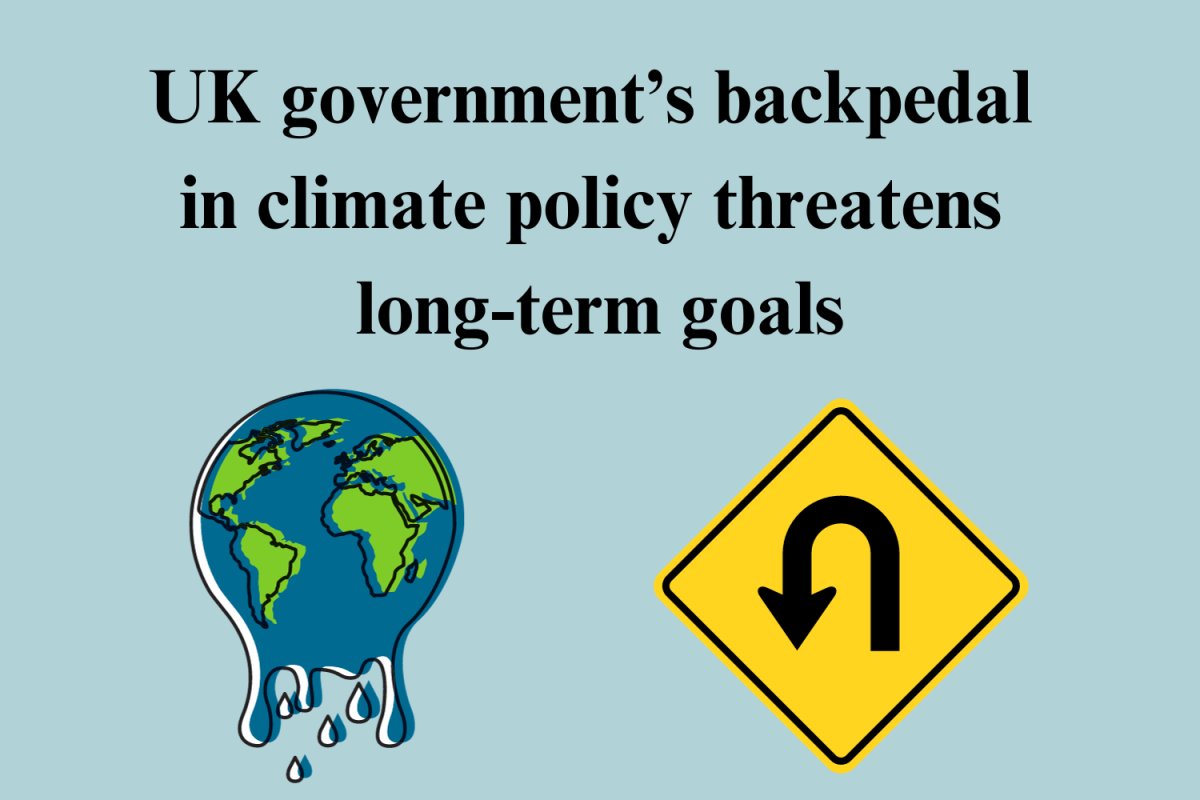Prime Minister Rishi Sunak announced a number of U.K. climate goals, specifically three major ones to be dialed down Sept. 20. Three major policies that have been reversed are new initiatives to push back the ban on the sale of diesel and petrol cars from 2030-2035, scrapping plans for rental properties to meet minimum efficiency requirements and delaying a planned ban on the sale of new gas boilers, according to the BBC. Sunak said these changes will not get in the way of achieving net zero by 2025.
However, toning down the three major climate goals is detrimental to the U.K.’s 2025 net-zero goal, as it puts critical intermediate climate targets at risk during a time when actions to combat climate change are needed most.
Due to Sunak’s policy, households will not be required to replace diesel and petrol cars as early. According to Transport for London, road vehicles contribute most to London’s air pollution. This means there will be polluting cars active on the roads for longer, spewing more carbon dioxide into the air.
Furthermore, landlords will no longer need to upgrade energy efficiency in their properties. According to the BBC, energy efficiency refers to how much heat and light a building uses, and it is scored on a scale from A to G, with A being the most energy efficient. Before Sunak implemented changes, landlords could only rent out properties that scored a C or higher. This hinders progress as fewer homeowners will upgrade their properties’ energy efficiency, leading to more household carbon dioxide emissions in the long run.
Despite Sunak claiming that the U.K. is still on its way to reaching net-zero emissions by 2050, these plans risk setting a precedent for more climate policy reversals in the future. Sunak’s actions suggest that climate goals can be easily changed when in reality, they must be strictly obeyed in order to see significant improvement.
Sunak also stated the delays would help financially pressed households save money, as they would not have to replace household systems or vehicles. Sunak claimed that delaying the planned ban on the sale of new gas boilers could help households save up to £15,000.
However, according to Carbon Brief, U.K. household energy bills in 2022 were 2.5 billion pounds higher than they would have been if numerous climate incentives had not been eliminated in the past decade. Thus, households will ultimately lose more money due to mark-ups on gas and electricity prices.
Furthermore, in the long run, the climate plans will do more harm than good by putting the U.K. at risk of missing key climate targets that the country is legally obliged to meet. All these reversals coming at an extra cost to households only further discredit the already unreasonable pushback of climate targets.
In 2022, prior to Sunak’s announcement, the Climate Change Committee, an advisory body that advises the U.K. government on climate change and climate policies, warned that in light of the government approving new licenses for the development of oil and gas fields in the North Sea, climate policies in place only covered one-fifth of the emissions cuts needed over the next decade, according to Carbon Brief. If the U.K. was already lagging behind in emissions cuts before the new rollbacks, the country will now fall even further behind.
The government’s establishment of more policies that will set the U.K.’s climate progress back when the climate policies in place beforehand were already inadequate is shocking.
The CCC has repeatedly cautioned the government that it is not on track to meet its climate pledges, some of which are legally binding under the Climate Change Act of 2008. Per the government’s estimates from March, the proposed ban on selling diesel and fuel cars after 2030 would have kept around 115 million tons of carbon dioxide from being emitted into the atmosphere from 2033 to 2038.
The U.K. has thus far been a global leader in efforts to reduce greenhouse gases and roll back the effects of man-made climate change, evidenced by hosting the UN Climate Change Conference in Scotland in 2021. However, as reported by The Guardian, no government ministers were present at a recent UN Climate Ambition Summit in New York.
Before the summit, the UN Secretary-General, António Guterres, declared that only world leaders who had demonstrated firm commitments to net zero would be able to speak – perhaps a signal that Sunak’s climate goals aren’t ambitious enough for Guitteres, who has called on developed countries to reach net zero as soon as 2040 instead of 2050.
Sunak’s absence from the summit is disillusioning for a country that has the influence needed to rally other nations around efforts to limit the effects of global warming. Sunak should be aiming to secure his role as a champion of green policies instead of introducing plans and rollbacks that make him ineligible to participate in important climate forums.
Repealing climate commitments and the risk of missing climate obligations will hinder the U.K.’s ability to remain a front-runner in the fight against climate change. By cutting back fundamental climate targets against widespread outcry from scientists and putting himself at odds with his own climate advisers, he risks setting back crucial progress on climate change.
As global citizens, our school community must stand against decisions that have negative consequences for our climate. We can accomplish this by signing petitions that call on the government to keep its climate pledges. Furthermore, we must stay well informed about climate change and its impacts in the UK and beyond by keeping up with the news. For more local insights, we can write to our areas’ MPs to ask about the climate initiatives being undertaken by our representatives in Parliament.










